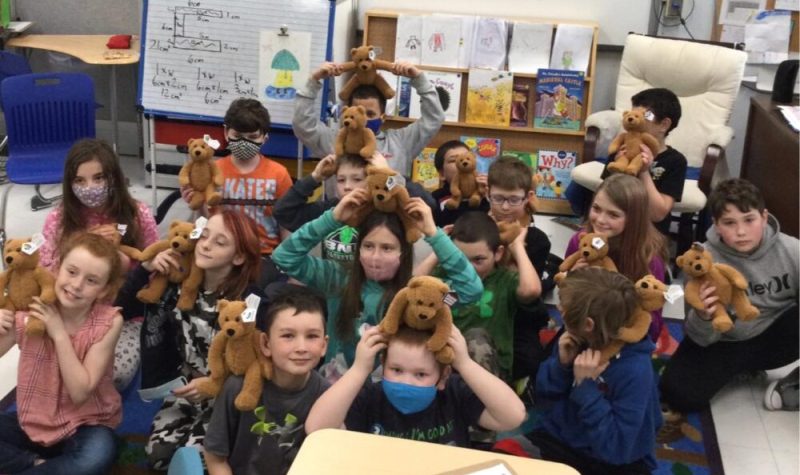Elementary school kids in the Tantramar brought home a special fuzzy friend this week.
The Tantramar COVID-19 Task Force brought “comfort bears” to the classroom, for all students grade four and under to enjoy.
The bears came with a little card attached to them, which explains a simple breathing exercise that helps calm the nervous system when stressed.
Two coordinators of the project and members of the COVID-19 Task Force, Carolle de Ste. Croix and Margaret Tusz-King, say that the bears are meant to address the extreme stress kids have been under this past year.
“We were hearing accounts from the professionals in our group saying that particularly young children and families seemed to be experiencing distress,” says Tusz-King. “We know that a lot of youth do not have good resilience strategies.”
Kids, says Tusz-King, are one of the most impacted demographics when it comes to the pandemic.
Between the major disruptions to their routine, social lives, and care, children are experiencing incredible stress and might not know how to process it.
“By the time we’re older, we’ve developed a lot of capacity and skills for mental resilience. It’s the youth and the children who were having the hardest time during the pandemic,” says Tusz-King.
The task force came up with a very simple breathing exercise: inhale for three seconds, hold for three seconds, and exhale for three seconds.
“It’s a technique that will we can carry through our life,” says Tusz-King, who is also a mental health first aid educator. “We are introducing it to young children this year, hopefully for a long-term benefit.”
What children are going through during this pandemic is trauma, which will need to be addressed even after vaccines are administered.
De Ste. Croix says that its important to draw on other historical traumatic events for reference, and to learn from the survivors of those events when considering how to help children cope with the pandemic.
“If you’ve spent any amount of time with anyone who who went through World War One, World War Two, Vietnam, Bosnia, you name it, you understand that… we are much more aware of PTSD and trauma,” says De Ste. Croix. “We have an entire generation especially younger ones, who are going to remember and live through trauma based on what we’ve gone through.”
Tusz-King went on to say that during and after this pandemic, there needs to be ongoing support for families in order for children to thrive.
“If we don’t support the families, that children will not do well,” says Tusz-King. “Our best investment is supporting families as a whole.”
On the theme of supporting families, De Ste. Croix says its important for parents to care for themselves as well as their children. She compared it to the recognizable pre-flight instruction to put an oxygen mask on oneself before helping others in the event of an accident.
Tusz-King adds that she has particular empathy for parents of children with disabilities, who might be additionally stressed on top of pandemic stress.
De Ste. Croix describes the comfort bear project as well-received, and is very grateful for the help the COVID-19 Task Force received from the community.
The Mount Allison bookstore was able to purchase the teddy bears, which were prepared by PEDVAC in Port Elgin.
On top of that, De Ste. Croix credits the Sackville Hospital, Sackville Memorial Foundation, Christmas Cheer, the Mount A Students’ Union, Atlantic Windows, Guardian and Corner Drug Store, and the Rotary Club.
If there’s one positive thing that has come from the pandemic, she says, it’s the trust and coming together of the local community.
For any children who need to talk to somebody, call Kids Help Phone at 1-800-668-6868.
Hear this story as reported:


